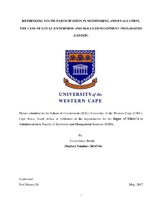| dc.description.abstract | The buzzword in recent development policy-making is PM&E. The notion is that; participatory
approaches have the appropriate remedy to curb the problem of exclusion. That notwithstanding,
the approach has become rhetoric in certain quarters rather than practical as admitted by some
scholars who hold the principle in high esteem. Inferences from the concept of empowerment as
put forward by Narayan (2005), might be the premise for rethinking the debate surrounding the
inclusion of beneficiaries in participatory monitoring and evaluation because of its undulation
positive effect on project outcomes. Over the past two decades, Ghana has initiated and
implemented a good number of national policies and strategies that are youth-centered. The
majority of these youth programmes are usually delineated in most public policies on thematic
areas such as employment, education, health, among many others. A total of 120 respondents
(project beneficiaries) were randomly selected for questionnaire administration, and 1 in-depth
interviewed was conducted for this study. Using a Participation Perception Index (PPI), developed
to assess the youth perception of the extent to which they were involved in the PM&E, the
following were ascertained. It was evident that the youth were only made to actively participate in
the data collection (as respondents) process. Evidently, the primary objective of the implementing
agency was to secure the youth (beneficiaries) job rather than involving them in the project PM&E.
The qualitative analysis also highlighted other critical factors affecting both the implementing
agency and the youth (skills or know-how, cost, lack of beneficiaries' interest, non-existence of
beneficiaries' associations) to ensure active participation. The study concluded that the end goal
of the youth intervention programme is tied into the ideas of project sustainability which can be
achieved when the various stakeholders are all on board in the PM&E. | |

